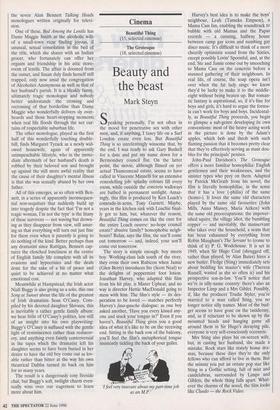Cinema
Beauty and the beast
Mark Steyn
Speaking personally, I'm not often in the mood for penetrative sex with other men, and, if anything, I fancy life on a Sarf London estate even less. But Beautiful Thing is so unrelentingly winsome that, by the end, I was ready to ask Gary Bushell for a date and put my name down for a Bermondsey council flat. On the latter point, the movie, although filmed on yer actual Thamesmead estate, seems to have called in Vincente Minnelli for an extensive remodelling job: splashy colours fill every room, while outside the concrete walkways are bathed in permanent sunlight. Amaz- ingly, this film is produced by Ken Loach's comrade-in-arms, Tony Garnett. Maybe, years in the kitchen sink with Loachie final- ly got to him, but, whatever the reason, Beautiful Thing comes on like the cure for the entire Loach oeuvre: no-hope council estate? abusive family? homophobic neigh- bours? Relax, says the film, the sun'll come out tomorrow — and, indeed, your son'll come out tomorrow.
The story is simple enough: boy meets boy. Working-class lads south of the river, they cross their own Rubicon when Jamie (Glen Berry) introduces Ste (Scott Neal) to the delights of peppermint foot lotion. Jonathan Harvey, who adapted this film from his hit play, is Mister Upbeat, and no way is director Hettie MacDonald going to mess with him. The film's style — its des- peration to be loved — matches perfectly Harvey's faux-gauche dialogue: as one boy asked another, 'Have you every kissed any- one and stuck your tongue in?' Even if you haven't, Beautiful Thing gives you a good idea of what it's like to be on the receiving end. Sitting in the back row of the balcony, you'll feel the film's metaphorical tongue insistently tickling the back of your gullet.
'I feel very insecure about my part-time job as an MP.' Harvey's best idea is to make the boys' neighbour, Leah (Tameka Empson), a Mama Cass fan, enabling the soundtrack to bubble with old Mamas and the Papas records — a cunning, halfway house between camp gay icons and numbing gay disco music. It's difficult to think of a more cheerily optimistic sound from the Sixties, except possibly Lovin' Spoonful, and, at the end, Ste and Jamie come out by smooching to Mama Cass on the concrete before a stunned gathering of their neighbours. In real life, of course, the soap opera isn't over when the fat lady sings: we know they'd be lucky to make it to the middle- eight without being beaten up. But roman- tic fantasy is aspirational, so, if it's fine for boys and girls, it's hard to argue the formu- la can't work for boys and boys. Incidental- ly, as Beautiful Thing proceeds, you begin to glimpse a sub-genre developing its own conventions: most of the heavy acting work in the picture is done by the Adam's apples, which bob and throb with such flaming passion that it becomes pretty clear that they're effectively serving as stunt dou- bles for the principals' penises.
John-Paul Davidson's The Grotesque offers a more familiar homophilia: English gentlemen and their weaknesses, and the sinister types who prey on them. Adapted by Patrick McGrath from his novel, the film is literally homophiliac, in the sense that it has a love (-philia) of the same (homo-). It loves the same old characters played by the same old favourites (John Mills, Anna Massey, Maria Aitken) with the same old preoccupations: the impover- ished squire, the village idiot, the bumbling copper — and inevitably, the manservant who takes over the household, a seam that has been exhausted by everything from Robin Maugham's The Servant to (come to think of it) P. G. Wodehouse. It is set in 1949, when Sir Hugo Coal (shrugged off, rather than played, by Alan Bates) hires a new butler. Fledge (Sting) immediately sets about bedding his master's wife (Theresa Russell, wasted as she so often is) and his prospective son-in-law. You'll notice that we're in silly-name country: there's also an Inspector Limp and a Mrs Giblet. Possibly, if, like the producer Trudie Styler, you're married to a man called Sting, you no longer notice silly names. Most of the bud- get seems to have gone on the taxidermy, and, as if reluctant to be shown up by the mounted heads and hanging game all around them in Sir Hugo's decaying pile, everyone is very self-consciously eccentric.
Mrs Sting also plays his on-screen wife, but, in casting her husband, she made a mistake. Rock stars like stately home dra- mas, because these days they're the only fellows who can afford to live in them. But the minute you put an ornate pop star like Sting in a Gothic setting, full of mist and candelabras, surrounded by Limps and Giblets, the whole thing falls apart. What- ever the charms of the novel, the film looks like Cluedo — the Rock Video.


























































 Previous page
Previous page